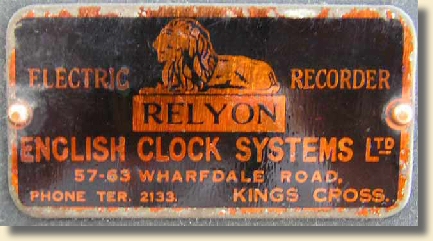
ECS Company History
Reginald Bailey and Thomas Johnstone started a company called Synchro Time Systems Limited (STS) which was registered on 4 August 1936 with a nominal share capital of £1000. The original Directors of the company were:
- Reginald Alfred Bailey (Electrical Engineer)
- Thomas Johnstone (Electrical Engineer)
- F.D.S. Jerrard (Gentleman)
- W.E. Thorne (Gentleman)
- J.T. Bett (Solicitor)
- G.E. Bouskell-Wade (Solicitor)
All six were also shareholders.
Reginald Bailey had been involved with industrial timekeeping since 1916 when he was fourteen years old, being particularly interested in the technical aspect of horology. The main business of STS was the installation and maintenance of Ericsson time recording equipment imported from Sweden, and the installation and maintenance of synchronous turret and advertising clocks.
At an Extraordinary General Meeting of the shareholders on 5 November 1937, just over one year after the company was formed, the £1000 initial capital was increased to £2000 and the value and allocation of shares was changed to reflect this cash input from S. Smith & Son (1934) Ltd. This move gave S. Smith & Son (1934) Ltd. 3000 of the 4000 available shares in STS and a seat on the Board.
STS thus became the Industrial Branch of Smiths, dealing with "Sectric" time recorders, turret and exterior clocks, advertising clocks and master clock systems. Initially it retained its own company name and the trade mark name of "Relyon", and traded from its address at Relyon House, 57/63 Wharfdale Road, Kings Cross, London.

Name-plate on a time recorder from 1950, showing the company's logo.
It had contracts with many well known names such as K.L.G. Spark Plugs, Gillette Industries, Littlewoods Ltd., Prudential Assurance Company and the Financial Times offices in London. Neon-lit turret clocks and advertising clocks using a Smiths "Sectric" synchronous motor and reduction gear formed a large part of the company's work in 1938.
On 28 March 1939, a Special Resolution was passed by the Board of STS to change the name of the company to English Clock Systems Limited, and in May 1939, two of the original shareholders, Messrs. Bett and Bouskell-Wade, transferred their shareholdings to S. Smith & Son (1934) Ltd., thus giving Smiths 3506 out of 4000 shares.
In June 1939, an English Clock Systems Ltd. (ECS) advertisement in the Horological Journal mentions "pendulum master clocks", so the design for their first 1-second master clock was probably complete and in a marketable form by then. This is the earliest published record found so far of a master clock from ECS. The development of the 1-second master clock was carried out largely by the ECS works manager, a Mr Powell.
In December 1944, the shareholding of S. Smith & Son (1934) Limited was transferred to Smiths English Clocks Ltd. and by December 1947 share ownership had changed again, to leave Messrs. Bailey and Johnstone with 20 shares each, and Smiths English Clocks Ltd with the remaining 3960 shares.
In February 1949, Reginald Bailey died at the age of 47, and in 1950 his shareholding was also transferred to Smiths English Clocks Ltd, giving them 3980 of the 4000 shares. The remaining 20 shares were still held by Thomas Johnstone, one of the founders of the original company.
In February 1955, Thomas Johnstone transferred his twenty shares, giving nineteen to Smiths English Clocks Ltd. and a single share to Mr. D.W. Barrett, who had previously been a shareholder from 1944 to 1947. Smiths English Clocks Ltd. now had 3999 of the 4000 shares. In 1960, Smiths acquired the last remaining share.
ECS had depots in Birmingham, Manchester, Leeds, Glasgow and Belfast, each with a depot manager who was responsible for sales and two or three service staff. There were also foreign agents in Greece, Holland, South Africa, Sweden and Algeria, although none were very active.
In September 1969, ECS moved its operating base to Park Royal in West London, and in October 1980, it had been taken over by Blick.
